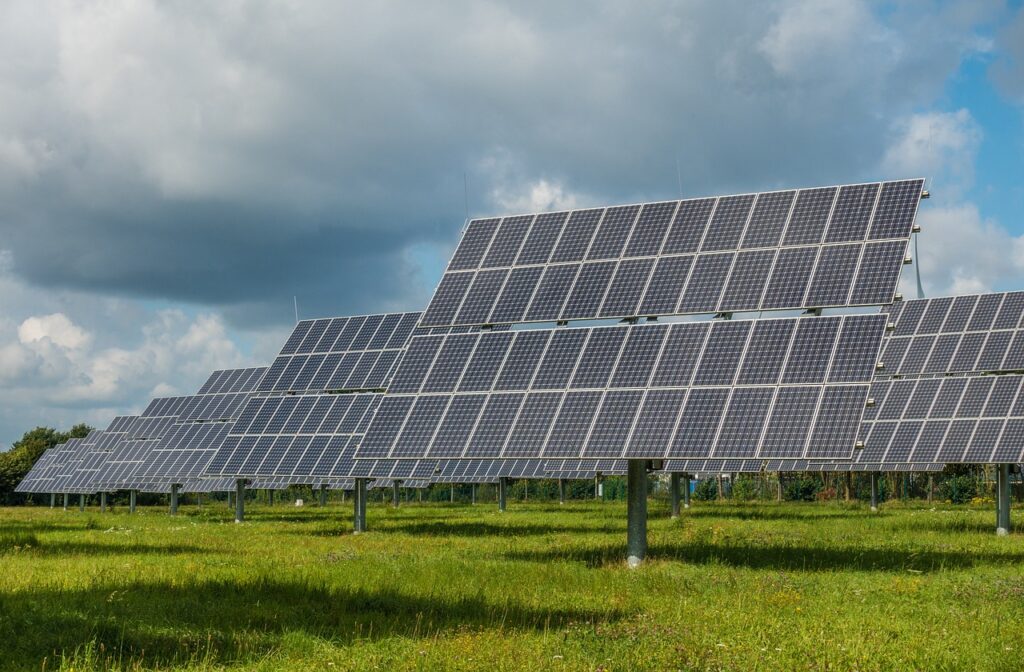
The advantages of renewable energy are clear—it’s a win-win for the planet and our future. Renewable sources offer a sustainable and eco-friendly alternative to traditional energy sources. By harnessing natural resources like sunlight, wind, and water, renewable energy solutions provide clean power while reducing environmental impact. Unlike fossil fuels, renewable energy is abundant and inexhaustible, significantly reducing greenhouse gas emissions. Embracing renewable solutions helps combat climate change, promotes energy independence, and creates new job opportunities in the green sector.
Table of Contents
Renewable Energy Basics
Solar Power
Solar power involves harnessing solar energy through photovoltaic cells. These cells convert sunlight into electricity efficiently. Residential and commercial buildings can utilize solar panels to generate their electricity sustainably. Furthermore, large-scale solar farms contribute significantly to sustainable energy production.
Wind Energy
Wind energy is harnessed by installing wind turbines that convert wind into electricity. This process is crucial for sustainable power generation. Both onshore and offshore locations are utilized to effectively exploit wind power’s potential. Maximizing wind energy can ensure a consistent supply of clean electricity.
Hydroelectric Power
Hydropower involves generating electricity from flowing water using hydroelectric dams. This method utilizes water’s kinetic energy to produce clean power efficiently. Small-scale hydroelectric projects are being implemented to meet local energy needs sustainably.
Biomass and Geothermal
Biomass energy involves converting organic waste into bioenergy, which can be used for heating and electricity generation. On the other hand, geothermal energy harnesses heat beneath the Earth’s surface for power generation and heating. Both biomass and geothermal energy serve as reliable sources of energy.
Environmental Benefits
Reducing Emissions
Transitioning to renewable sources significantly lowers greenhouse gas emissions. We can reduce the harmful gases contributing to climate change by utilizing solar, wind, and hydroelectric power. The shift to renewable sources has also helped minimize air pollution, creating cleaner and healthier environments.
Renewable energy is pivotal in combating climate change by reducing carbon footprints. Adopting sustainable energy solutions can actively contribute to mitigating global warming effects. This proactive approach is crucial to addressing today’s urgent climate crisis.
Combating Climate Change
Promoting renewable energy is a critical strategy for combating climate change. By focusing on sustainable energy solutions like solar and wind power, we can work towards reducing our environmental impact. Embracing clean energy practices is essential to fostering a more sustainable future for future generations.
Adopting this type of energy mitigates global warming effects and helps address the broader issue of climate change. Sustainable energy initiatives offer a path towards reducing carbon emissions and promoting environmental stewardship. By embracing clean energy sources, we are taking significant steps towards a greener and more sustainable planet.
Sustainability
The widespread adoption of sustainable energy promotes long-term sustainability in our energy systems. By harnessing solar, wind, and geothermal power, we ensure resource conservation and environmental protection.
By prioritizing sustainability through clean energy practices, we pave the way for a more environmentally conscious future. Integrating renewable sources into our energy mix is essential for achieving lasting sustainability goals.
Biodiversity Protection
Reducing reliance on fossil fuels through sustainable energy helps preserve ecosystems worldwide. By transitioning to cleaner power sources such as solar and wind, we safeguard wildlife habitats from the detrimental effects of pollution and habitat destruction. Sustainable energy practices are vital in promoting biodiversity conservation efforts.
Preserving biodiversity is crucial for maintaining ecological balance and protecting endangered species. Renewable energy projects offer an opportunity to promote biodiversity conservation while meeting our growing energy needs sustainably. By embracing clean energy solutions, we can protect biodiversity and contribute to a healthier planet for all living organisms.
Economic Advantages
Job Creation
Renewable energy stimulates employment opportunities, particularly in solar and wind power sectors. These industries create green jobs that contribute to a sustainable economy. By expanding the workforce in renewable solutions, countries can experience significant economic growth.
Long-term Savings
Investing in renewable sources translates to substantial long-term savings. Businesses and households can significantly reduce operational costs by opting for renewable sources. This reduction extends to maintenance expenses, ensuring more financial stability in the long run.
Embracing renewable energy solutions benefits the environment and leads to considerable financial advantages. The initial investment in renewable infrastructure pays off through lower utility bills and decreased reliance on traditional energy sources.
Energy Independence
Renewable energy plays a crucial role in enhancing nations’ energy independence. By relying on clean and sustainable power sources, countries reduce their dependence on imported fossil fuels. This shift towards renewables ensures greater control over energy resources and enhances national security.
Price Stability
Investing in renewable energy solutions ensures stable energy prices over time. Unlike non-renewable sources, which are subject to price fluctuations, renewable energies provide a more predictable cost structure. Individuals and businesses can secure consistent and manageable energy expenses by embracing renewable technologies.
Social Benefits
Public Health
Renewable energy improves public health by decreasing air pollution caused by burning fossil fuels. This reduction in pollution leads to cleaner air and water, enhancing overall well-being. Transitioning to renewable energy helps prevent health issues associated with pollution.
Energy Security
Renewable energy is crucial to enhancing energy security by diversifying energy sources. It reduces the dependence on energy imports, ensuring a more stable energy supply. Clean power sources contribute to maintaining energy availability and resilience.
Sustainable Development
The integration of renewable energy is essential for promoting sustainable development. It allows for economic growth while preserving environmental resources for future generations. Sustainable energy infrastructure fosters social progress and community well-being.
Renewable Energy Reliability
Technological Advances
Renewable energy solutions continuously evolve to enhance efficiency and sustainability. Innovations drive the development of cutting-edge solutions for clean energy production, ensuring a more sustainable future. Advanced systems are being implemented to optimize the efficient utilization of renewable energy solutions.
Grid Integration
Integrating sustainable energy into existing power grids ensures reliability and stability. Innovative grid technologies are crucial to enhancing grid stability by efficiently managing the integration of renewable sources. This integration enables a seamless connection of solar, wind, and other renewables to the grid, further enhancing reliability.
Incentives and Subsidies
Governments worldwide are actively promoting the adoption of sustainable energy by offering various incentives and subsidies. These measures aim to make clean energy projects more financially feasible for individuals and organizations.
Energy Independence
Local Production
Support local economies by producing energy locally. Community-based projects enhance sustainability and foster regional development.
Creating decentralized energy production systems can lead to greater energy independence and resilience.
Local production also reduces transmission losses associated with transporting energy over long distances.
Reducing Imports
Expanding domestic renewable sources is important to decreasing the country’s reliance on energy imports. Prioritizing local renewable energy production over imported fossil fuels can help minimize trade deficits and enhance energy independence by reducing dependence on foreign energy. In the long run, reducing imports can strengthen national security and stabilize energy prices.
Public Health Improvements
Cleaner Air and Water
Sustainable energy improves air quality by reducing harmful emissions from traditional energy sources. We can significantly enhance environmental health by harnessing solar, wind, and hydropower. The shift to renewable sources has helped protect ecosystems and human health by promoting cleaner air and water.
Renewable energy solutions also play a crucial role in reducing water pollution. By minimizing the discharge of harmful chemicals into water bodies, these sustainable sources help preserve aquatic life. Transitioning to clean energy sources is essential for ensuring a healthier environment for current and future generations.
Reduced Healthcare Costs
Transitioning to renewable energy solutions lowers healthcare expenses by decreasing the prevalence of pollution-related illnesses. By mitigating air and water pollution through clean energy adoption, societies can save significantly on medical costs. Clean energy initiatives aim to improve public health outcomes and alleviate the burden on healthcare systems.
The adoption of clean energy benefits the environment and directly impacts public health by reducing the incidence of respiratory diseases and other ailments caused by pollution. By investing in sustainable energy solutions, communities can achieve substantial savings in healthcare expenditures while fostering a healthier population overall.
Job Opportunities in Renewables
Sector Growth
Investments drive growth in the sustainable energy sector, leading to increased job opportunities and economic development. The influx of funds stimulates innovation and enhances competitiveness within the industry.
Skill Development
Training programs in clean energy technologies improve workforce skills, preparing individuals for careers in clean energy. Education initiatives focus on developing expertise in solar, wind, and other renewable energy sectors.
Summary
Renewable energy promotes sustainability, creates job opportunities, and improves public health. Embracing renewable energy solutions can lead to a more reliable and cost-effective energy system, enhancing our energy independence while benefiting society.
As you continue to explore clean energy, consider how you can contribute to this sustainable shift. Whether you support renewable initiatives, advocate for policy changes, or make small changes in your daily life to reduce energy consumption, your actions can make a difference.
Frequently Asked Questions
What are the key advantages of renewable energy?
Renewable energy offers environmental benefits by reducing carbon emissions, economic advantages through cost-effectiveness, and social benefits like improved public health, energy independence, and job opportunities in the renewables sector.
How do renewable sources contribute to environmental sustainability?
Renewable sources such as solar and wind power generate electricity without emitting greenhouse gases, helping to combat climate change and reduce air pollution for a cleaner environment.
Are renewable energy solutions reliable for meeting our energy needs?
Advancements in technology have increased the reliability of renewable energy sources like solar and wind power. With proper infrastructure and storage solutions, renewables can provide a consistent power supply even during peak demand.
Are there economic advantages associated with investing in renewable energy?
Investing in renewable energy is economically beneficial due to lower operational costs over time, reduced reliance on fossil fuels, potential government incentives, and job creation within the growing renewable energy industry.
